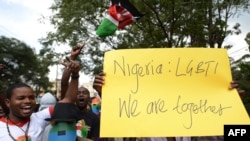The Nigerian parliament on Tuesday called for an investigation of the Samoa Agreement, a pact federal authorities signed with the European Union, after a media report that some of the deal’s clauses could promote same-sex relationships.
Nigerian authorities have denied the claims and promised to act against news organizations reporting them.
Lawmakers said authorities did not consult them before signing the bill. A majority voted to investigate the agreement, which is named after the Pacific Island nation of Samoa, where it was first reached in November.
Critics such as House of Representatives member Aliyu Madaki said the Samoa Agreement needs to be clearer on clauses that promote gender rights.
"The phrase 'gender equality' is a Trojan horse for deceptively bringing in all sorts of immorality to our country, as gender no longer means sexes male and female as traditionally understood. It now includes homosexuality, lesbianism, transgenderism and animalism," Madaki said.
Nigerian authorities signed the Samoa Agreement among the EU and 79 other countries, including African, Caribbean and Pacific nations, on June 28.
Authorities say the agreement aims to strengthen partnerships for democratic norms and human rights as well as promote economic growth and development. It’s also designed to help member nations tackle common challenges such as climate change, migration and security.
Authorities said Nigeria signed the agreement after extensive reviews and consultations.
The pact became a topic of national discussion following a report by a Nigerian newspaper, Daily Trust, that said the deal’s clause on gender rights could be misinterpreted to promote same-sex relationships.
This week, Nigerian authorities held a media briefing in Abuja to debunk such claims and promised to sue the newspaper. Authorities also refuted claims that Nigeria will pocket $150 billion from signing the deal.
Information Minister Mohammed Idris Malagi told reporters, "We are alarmed by the level of reckless reporting and statements by some media organizations and individuals that border on national security and stability. We find that despicable and wicked, because the allegation is nowhere in the document signed on behalf of the federal government.
“It is, however, disheartening that some elements are abusing this free [media] environment guaranteed by the government," he said.
Nigeria outlawed same-sex relations in 2014 and imposed a 14-year jail term for offenders.
On Tuesday, the Nigerian Bar Association backed the government’s position after reviewing the agreement.
But the chairperson of the Human Rights Committee at the African Bar Association, Sonnie Ekwokusi, told Lagos-based Channels Television that Madaki is making a valid point.
"This Samoa agreement is littered with the phrases of the EU and United Nations,” Ekwokusi said. “I know the language of the EU. I know what they're talking about."
Daily Trust has said that its reporting was in the interest of the public and that it will apologize only when it is proven that the “gender rights” cited in the agreement means traditional male-female relationships and nothing more.




